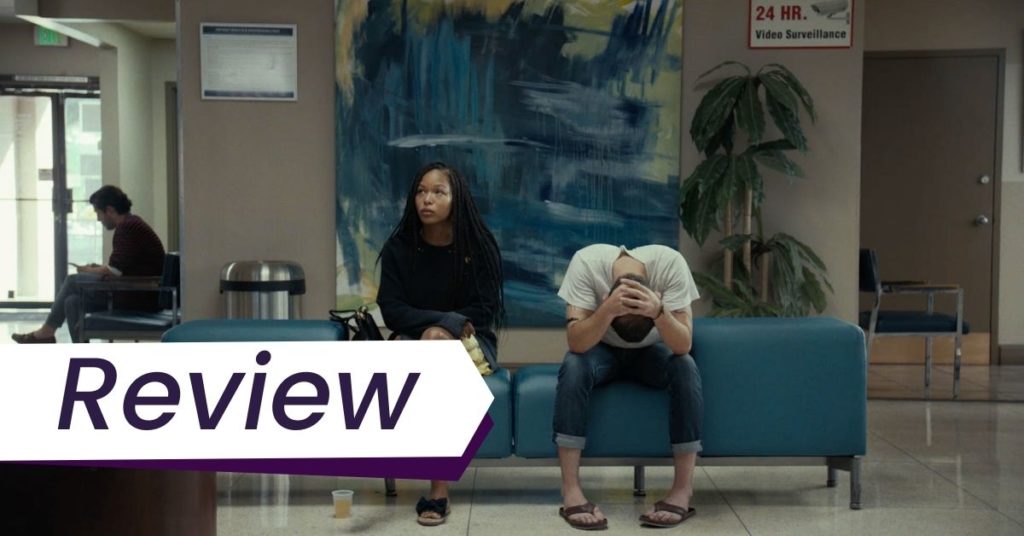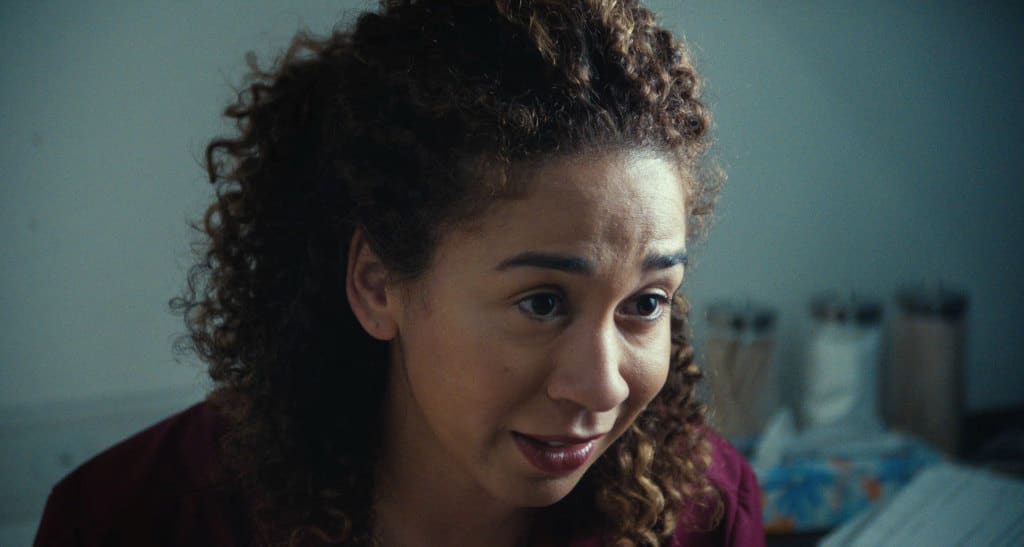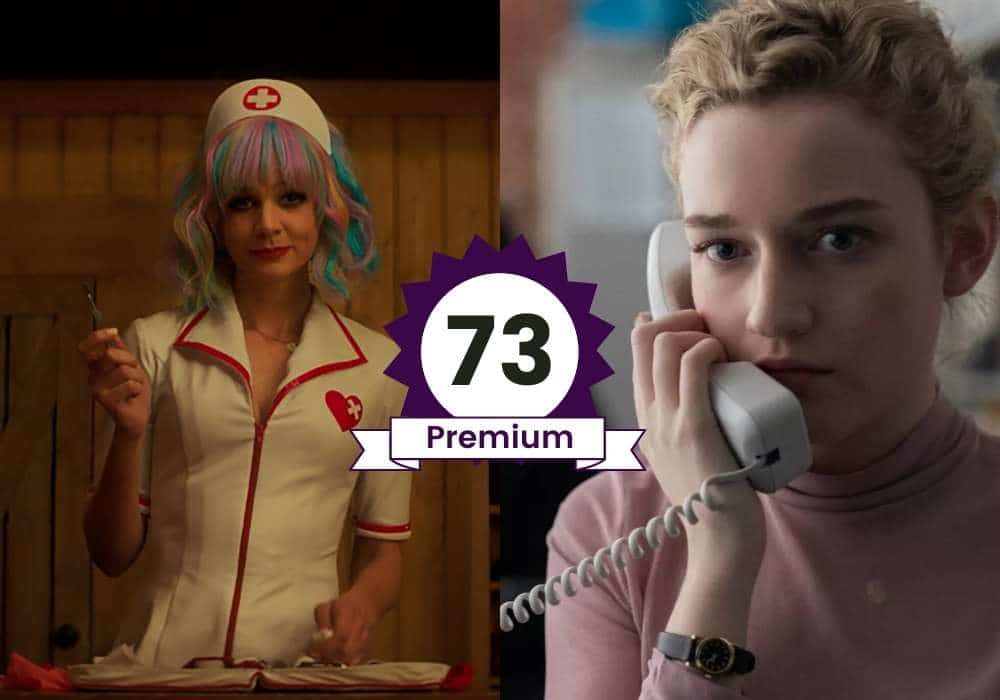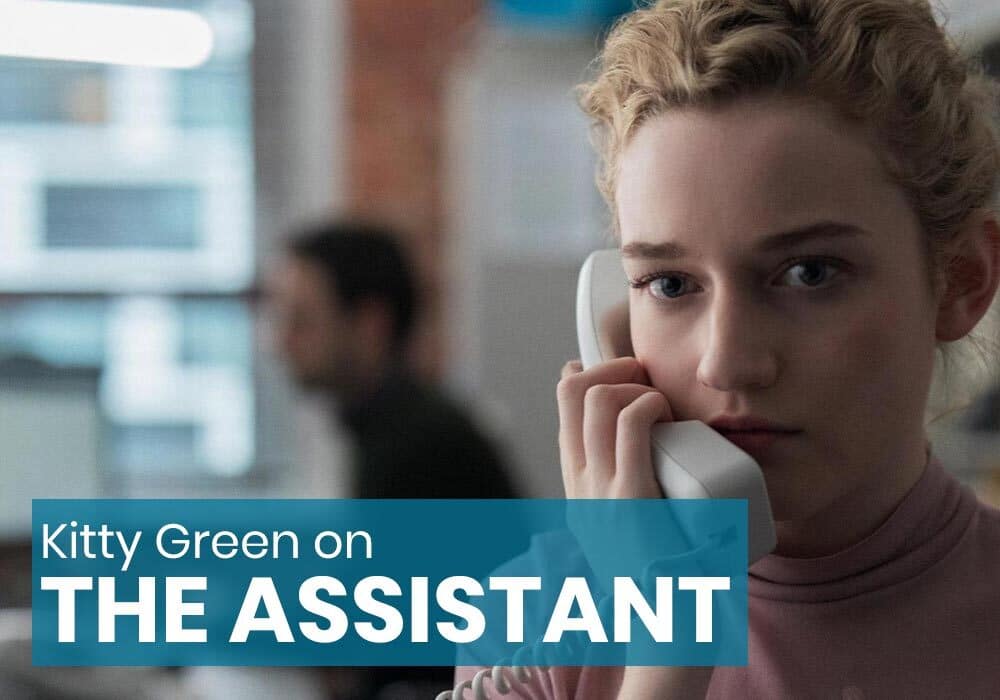Shatara Michelle Ford’s Test Pattern explores power dynamics, in the lead up to and aftermath of a sexual assault, and how a couple copes.
Test Pattern is now screening in Canadian and US Virtual Cinemas here.

Discover one film you didn’t know you needed:
Not in the zeitgeist. Not pushed by streamers.
But still easy to find — and worth sitting with.
And a guide to help you do just that.
Shatara Michelle Ford’s first feature, Test Pattern, is an exploration of power dynamics — between men and women, Black people and white people — in the context of both romantic relationships and sexual assault. The film opens with a wide shot of Renesha (Brittany S. Hall) being kissed by a white man (Drew Fuller) in a relatively dark, nondescript room. Ford keeps the details deliberately vague: we don’t know where she is, who he is, or what the nature of their relationship is, but on the surface, it seems sweet. We then cut to what we will later learn is the past. On a night out with friends, Renesha meets another white man, Evan (Will Brill), who asks for her number, and who she later runs into at a grocery store, admonishing him for never calling.
If you know the basic premise of Test Pattern — in the wake of a sexual assault, a woman and her boyfriend deal with a Kafkaesque system as they try to get a rape kit — you’re left wondering, which of these two men is the aggressor behind the sexual assault, and which will be the boyfriend who helps her deal with it. Evan is insecure and shy, and her encounter with him in a dark parking lot of a grocery store feels like it could be an unsafe one. He can’t believe she’s interested in him, but is he a nice guy or a Nice Guy? It’s hard not to worry if she’s putting herself in danger by having dinner with him. This ambiguity is part of Ford’s point: anyone can become an aggressor, because most sexual assaults are committed by people we know and even trust, unlike what Promising Young Woman might have you believe.
Evan and Renesha’s relationship starts off tentative but sweet, with Renesha seeming to hold the balance of power both financially and because she’s a knockout. He’s a tattoo artist; she’s a high-powered business woman. He wears clothes full of holes; she lives in a swanky apartment with multiple decks. She invites him over for dinner, and he tilts them in the direction of her bedroom while she gives him the tour. He’s nervous and babbling, but when he asks her where she sleeps — her bedroom was left off the tour because it’s a mess — we wonder if it’s flirtatious or coercive, maybe both. Still, they both pretty much go for each other at the same time; she seems completely delighted, and he’s tender.

The film skips ahead in time by years to when the couple are in a long-term relationship where that power differential seems even more stark. She trades her relaxed hair for natural braids and has a sleeve of tattoos. They’ve moved into a lovely home together, where he takes on the domestic duties of chef and carer. Her wardrobe alone tells us she’s the primary breadwinner. Is he a leach or a good partner? Ford doesn’t ask us directly, but the power dynamic of a skint white man and a wealthier Black woman are in the air.
The evening of the sexual assault involves a series of seemingly harmless decisions, in which the people who are supposed to care for Renesha ignore her, and she loses her defenses. Her friend Amber (Gail Bean who played the pregnant teenager in Unexpected) wants her to go out drinking on a work night, and Evan refuses to accompany her because he hates bars. Amber wants to party, and when they’re approached by a pair of handsome and wealthy white men, entrepreneurial bros, Amber is excited to take them up on their offer of a drink. Renesha went out with the plan to not drink and to go home early. But the men want to celebrate with drink, and then drugs, and one of them, Mike (whom we realise is he man from the first scene in the film) persuades her — with help from Amber — to indulge, as well. Does this make Amber complicit? Should Evan have come out with her? Renesha is a grown woman, and it’s not their job to protect her at all times, but Ford weaves in these details so that the characters might feel guilty, whether rightly or wrongly, in the aftermath.
Initially, Mike seems arrogant but friendly. His wheedling to get Renesha to share a drink seems relatively harmless, if a bit unsettling. But one concession isn’t enough for him. As soon as she starts to let down her defenses, he pushes her more and more — to take drugs (which she hates), to dance, and to accept his kiss on the dance floor as she starts to lose her wits. Amber, meanwhile, is too busy sucking face to notice her friend might be in danger. She’s having fun so why should she think Renesha is in trouble? But before long, Mike is whisking Renesha away, and things get increasingly dark and sinister.
The film is divided into three acts of approximately equal length: the courtship between Evan and Renesha, the evening of the assault and what leads up to it, and the aftermath of how Evan and Renesha deal with what’s happened. The film’s structure asks us to compare the courtship between Evan and Renesha with Mike’s (Drew Fuller) more one-sided flirtation with Renesha. In the aftermath, Renesha becomes almost numb from the trauma while Evan is obsessed with getting a rape kit, which proves a Kafka-esque nightmare.
Evan’s insistence on putting her through the search for a rape kit, dragging her from one hospital to another, begs the question of whether he, too, is removing her autonomy in the wake of her trauma. Or is he merely the fortunately cool-headed privileged white man she needs to help her in the search for some kind of justice? The film doesn’t make it explicit whether or not her difficulties getting a rape kit are connected to her Blackness, but there’s a paranoid sense that the ambivalence of the white people in charge is rooted in racism. It’s noteworthy that it’s not until they encounter a Black doctor that Renesha actually gets her rape kit. Renesha seems almost resigned to their unhelpfulness at every stage, while Evan is angry and shocked, which leaves her increasingly isolated. The necessity of going through this administrative nightmare also prevents them from having a conversation and from him being able to offer her comfort; he’s too busy dealing with the aggravation of the system.

Renesha swings between frustration at going through the motions to get a rape kit, and relief that Evan is pushing her to do it. She’s resistant at first, both because she’s tired and traumatized, but also, we increasingly suspect, because she doesn’t see the point. So few sexual assault cases are prosecuted at all, but when there are no other witnesses, and the victim is a Black woman, what are her chances? We feel her world-weariness in the way Hall slumps and drags her feet, always trailing behind Evan who is unable to stop moving or fidgeting in his anxiety.
Renesha repeatedly tries to talk him out of continuing the quest as more and more barriers are put in place. Still, when she accidentally spills her urine sample on the floor when walking away from him in a huff, Hall’s face drops. Renesha fought Evan at every turn about the inconvenience of collecting that urine sample, convinced there was no point, but when the option of even having it (despite the fact that it’s in a plastic drinking cup and so probably compromised anyway) is taken away, she’s devastated. Knowing your case is unlikely to be successful is not the same as losing the chance to even build one.
As we head toward Renesha finally being able to get a rape kit, the distance between her and Evan has widens. When Renesha returns home the morning after being assaulted, Evan is calm, collected, and gentle. As Renesha curls up on the floor, he sits down with her, never judging, never blaming, only quietly trying to console her and find out what happened. He offers her light, reassuring touches and a blanket. By the time they’re in the final medical clinic, they’re sitting feet apart on a bench, not even looking at each other. By the time they get home, they can’t even talk to each other. Whether their distance is because of the stress of the day, Evan’s insensitivity to Renesha’s wishes, or the fact that Renesha can no longer ignore certain differences in their relative privilege, remains ambiguous. Ford deftly manages this ambiguity, offering a narrative about sexual assault in which the assault itself is not what potentially tears a couple apart, but how they deal with the aftermath, in a world where justice is hard to come by, as unthinkable as that may be for a white man.
You could be missing out on opportunities to watch great films Test Pattern at virtual cinemas, VOD, and festivals.
Subscribe to the Seventh Row newsletter to stay in the know.
Subscribers to our newsletter get an email every Friday which details great new streaming options in Canada, the US, and the UK.
Click here to subscribe to the Seventh Row newsletter.




